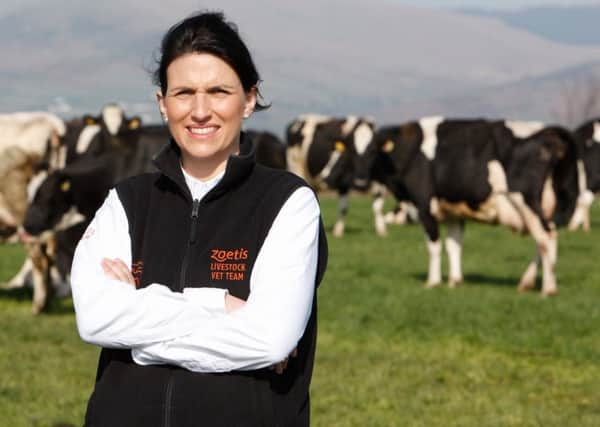Good respiratory health could be worth £562 per dairy heifer


Aurelie Moralis, Veterinary Consultant with Zoetis, emphasises that the long term effect of disease on productivity is an increased age at first calving, a reduction in lactation yields and a reduced longevity in the herd of up to 109 days. Therefore the lifetime value of good respiratory health in a dairy calf could be worth £562 even in today’s challenging economic climate with margins over purchased feed estimated at £12.69 ppl.
She explains that in order to achieve an age at first calving (AFC) of 24 months, heifers will need to grow on average 0.8 kg per day and will have to reach 60% of their mature weight at around 13-14 months for bulling. Heifers growing an average of 0.64 kg/day won’t reach their target weight for first calving until 30 months.
Advertisement
Hide AdAdvertisement
Hide AdShe points out that growth can be measured easily using weigh bands (very accurate up to weaning), weigh cells placed in a crush or even monitoring wither’s height by drawing height lines on the crush wall. This allows identification of heifers which haven’t achieved their target. By starting to weigh heifers at a very young age and recording data farmers can quickly identify reduced average growth rates as well as outliers in a group of calves and then act on the data.
Regarding respiratory health she explained: “To ensure protection against BRSv and PI3v, two key respiratory viruses in young calves, Rispoval ® IntraNasal can be administered as a single dose at nine days of age, to provide 12 weeks protection. At 12 and 15 or 16 weeks of age Rispoval ® 4 can be given by intramuscular injection to provide a further six months protection against BRSv and PI3v and also provide cover against IBR, and BVDv.
“Since Rispoval ® IntraNasal can be administered from just nine days of age, it provides the earliest protection against BRSv and PI3v, ensuring that calves are covered during this critical pre-weaning period when pneumonia can have a significant impact on future productivity, especially an increased age at first calving.”
She went on to explain that high calf growth rates from 0-9 months of age, leading to excellent fertility of maiden heifers and calving at 21-23 months resulted in survival rates of 80% from first calving to 5 years of age, and a total milk production of 24,000 litres over 5 years from birth. Heifers calving at 30 months as a result of poor calf growth rates ended up with an average milk production of 8000 litres over five years and a survival rate of only 30%!
Advertisement
Hide AdAdvertisement
Hide AdAccording to CAFRE figures the average cost to rear a replacement heifer is in the region of £2,000 per heifer. On a farm with a 30% replacement rate and a yield of 7,500 litres per cow this equates to a cost of 6 pence per litre. There is a significant range in rearing costs with the top CAFRE benchmarkers achieving an average rearing cost of £1,500 per head. These farms focus closely on all aspects of the heifer rearing enterprise such as careful management of calves from birth through to weaning to reduce disease risks. They also monitor heifer growth rates and target concentrate feeding to achieve earlier service weights to have heifers calving at two years of age. The Northern Ireland age for calving heifers is 33 months so there is room for a marked improvement.